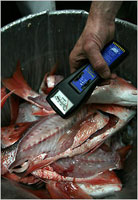 My wife and I are celebrating our 25th wedding anniversary in a week by having dinner at Le Bernardin. I had proposed in the Le Bernardin, when the restaurant was still in Paris, so it has always seemed a great place to celebrate anniversaries. What does this have to do with radiation? The New York Times recently reported:
My wife and I are celebrating our 25th wedding anniversary in a week by having dinner at Le Bernardin. I had proposed in the Le Bernardin, when the restaurant was still in Paris, so it has always seemed a great place to celebrate anniversaries. What does this have to do with radiation? The New York Times recently reported:
“Eric Ripert, the chef of Le Bernardin, the high temple of seafood in Manhattan, bought a new kitchen gadget a few days ago: a radiation detector.
“I just want to make sure whatever we use is safe,” said Mr. Ripert, whose staff is using the device to screen every item of food that enters the restaurant, regardless of its origin. He has also stopped buying fish from Japan, which means no high-quality, farm-raised hamachi and kampachi for raw seafood dishes.
“Nobody knows how the currents will carry the contaminated water,” he said.
Despite assurances by health officials that radiation from the stricken Fukushima Daiichi nuclear power plant in Japan is unlikely to show up in the food supply, worries about contaminated foods are growing among consumers, businesses and governments across the globe.
Does the continuing crisis at the Fukushima nuclear power plants in Japan pose a threat to ocean life and seafood? The best answer is probably that no one knows. Nevertheless, most experts are of the opinion that the threat is quite low. All the same, the FDA has begun scanning seafood imported from Japan for radiation. Less than 1 percent of the total fish Americans consume comes from Japan, according to the U.S. Department of Commerce.

I can’t answer your seafood question, but I can cover nuclear energy in a more entertaining fashion than most:
One of the interesting things about modern nuclear power in the US is that few really understand how it works day to day, and I include in that bin most scientists and journalists who are commenting to the media on the topic.
I’ve worked in the US nuclear industry for 25 years. My novel “Rad Decision” culminates in an event very similar to the Japanese tragedy. (Same reactor type, same initial problem – a station blackout with scram.) The book is an excellent source of perspective for the lay person — as I’ve been hearing from readers. The novel is free online at the moment at http://RadDecision.blogspot.com . (No adverts, nobody makes money off this site.) Reader reviews are in the homepage comments.
Unfortunately, my media presence consists of this little-known book and website, so I’m not an acknowledged “expert”. I just do the nuclear stuff for a living. And I think I have explained it well in a non-yawn-producing manner. But it’s a bit of a tree falling in a forest………
I believe there isn’t a perfect energy solution – just options – each with their good and bad points. And we’ll make better choices about our future if we first understand our energy present.
I these days when fish can be caught in Long Island Sound and are put in barrels with air pumps and those fish arrive in Asia still alive the next day. There is no telling how a radioactive tainted fish might travel around the world and end up on someones plate in New York.
I know that customer perception is a concern and if screening the fish and other food alleviates concerns then that is a good thing.
But my concern is that the people doing this screening don’t have the training and knowledge to understand what they are doing. What if a waiter at the restaurant has recently had a medical test involving radioactive material (some of which involve I-131)? This could cause a false high reading when checking a shipment of fish, and that is just one example of things that can interfere with or cause false radiation readings.
I may have a concern about my heart but I am not going to go to my mechanic who just bought himself a stethoscope and have him listen to my heartbeat. I will go to a doctor. Taking radiation measurements isn’t as difficult as medical science but it also isn’t as simple as flipping a light switch. There is training that is needed to properly use the equipment and to properly interpret the results from the equipment.
The FDA is scanning Japanese fish for radiation but never checks more than 2% of fish being imported. I suspect that the independent taking of radiation readings will do more to calm fears than to elevate them. At worst, a high reading could be confirmed or most likely denied after further testing. I suspect that lots of folks will find that despite the occasional crazy in the media that the risks from radiation in our food supply are minimal.
Its too late!
Its in the air we breath, it falls as rain and pollutes the lakes, streams and groundwater.
As I said the other night, I bet if I turn off the light, my beer is glowing!
From my memories of the warnings that came with upstate NY fishing permits 30 years ago, heavy metal contamination of US river fish seems to be a risk several orders of magnitude higher…
I agree Mike. I think the greater risk is heavy metals in fish. Radiation has caught everyone’s attention but I suspect we are at greater risk from mercury than radioactive cesium or iodine.